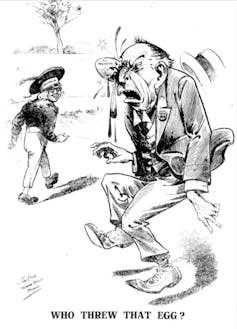How the 'Warwick egg incident' of 1917 exemplified an Australian nation divided
- Written by Jeff Kildea, Adjunct Professor Irish Studies, UNSW
In an era of centenaries associated with the first world war, one that might slip under the radar is the Warwick egg incident.
The Warwick egg incident of November 29, 1917, occurred during the second conscription referendum campaign. Two Australians of Irish descent, Pat and Bart Brosnan, threw eggs at the prime minister, Billy Hughes, whose train had stopped at Warwick in Queensland’s Darling Downs. Hughes was there to speak in support of conscription at a meeting on the railway platform.
One egg hit the prime minister’s hat, starting a fight as Hughes’s supporters laid into the assailants, who were removed from the station. After order was restored, Hughes began his speech. But Pat had returned and started interjecting. Hughes jumped off the platform and into the crowd shouting: “Arrest that man!”
Pat was again removed. Later he would claim he threw the egg because he did not want to be conscripted.
Although many incidents of political violence occurred during the conscription campaigns – meetings were disrupted and speakers attacked – this event stands out for three reasons. First, it involved an assault on the prime minister of Australia. Second, it led to the establishment of the Commonwealth police force – later the Australian Federal Police. More significantly, it was symptomatic of the deep divisions in Australian society, exacerbated by the hard-fought political campaign over conscription: Irish Australians versus British Australians; Catholics versus Protestants; labour versus capital; empire loyalists versus Australia-first nationalists; the Queensland government versus the federal government.
 A cartoon of the Warwick egg incident of 1917.
Author supplied
A cartoon of the Warwick egg incident of 1917.
Author supplied
It is difficult to comprehend the depth of those divisions today, particularly those along ethno-religious lines. Sectarianism, in the sense of the conflict between Protestants, then mostly of British descent, and Catholics, then almost exclusively of Irish descent, was a significant factor in social and political discourse in early 20th-century Australia.
When war broke out in August 1914, such differences were put aside, as Protestants and Catholics joined together in support of the war effort. But the uneasy truce was shattered during Easter week 1916, when Irish rebels seized the GPO in Dublin.
At first, Australian Catholics deplored the rising. But when the British military declared martial law and began executing the rebel leaders and interning thousands of Irish men and women, Catholics began to criticise the British government, provoking a Protestant backlash.
The sectarian divide widened following the first conscription referendum in October 1916. Prime Minister Hughes and the mainly Protestant empire loyalists blamed the “disloyal” Irish Catholics for the referendum’s defeat.
Class divisions also emerged over conscription, as living standards declined as a result of wartime austerity. The failure of Labor governments to meet workers’ expectations led to industrial disputes that rose to levels not seen before or since.
Tensions rose during 1917, with the belligerent, Irish-born Melbourne Archbishop Daniel Mannix criticising the war as an “ordinary trade war”. He engaged in a public slanging match with the prime minister, arguing that Australia had done enough, and that if Britain ended its occupation of Ireland it would not need Australian conscripts.
Read more: Only the conscription referendums made Australia’s Great War experience different
Another outspoken critic of the federal government’s war policy was the Labor premier of Queensland, Thomas Joseph Ryan, an Australian Catholic of Irish descent. Desperate to censor Ryan’s anti-conscription rhetoric, Hughes raided the Queensland Government Printing Office to seize copies of Hansard containing parliamentary speeches opposed to conscription.
To Hughes, the perceived influence of the Irish in Australia was alarming. In August 1917, he told the British prime minister, Lloyd George:
The Irish question is at the bottom of all our difficulties in Australia. They — the Irish — have captured the political machinery of the Labor organisations — assisted by syndicalists and I.W.W. [Industrial Workers of the World] people. The Church is secretly against recruiting. Its influence killed conscription.
(The Industrial Workers of the World was a revolutionary left-wing union-based organisation.)
Speaking of the general strike then taking place in NSW, Hughes added:
… [T]he I.W.W. and the Irish are mainly responsible for the trouble. In a sense it is political rather than industrial. … [T]hey are now trying to take the reins of Govt out of our hands.
It was against this background that Hughes found himself in Warwick, on his way back to Sydney, following the raid on the Queensland Government Printing Office. His worst fears were confirmed when a Queensland police officer, Senior Sergeant Henry Kenny, a Catholic of Irish descent, refused to arrest the egg throwers for breaching Commonwealth law, saying he answered to the Queensland government only.
This led Hughes to draft a regulation establishing the Commonwealth police force. In advising the governor-general on the regulation, Hughes wrote:
This will apply to Queensland where present position is one of latent rebellion. Police is honeycombed with Sinn Feiners and I.W.W … [T]here are towns in North Queensland where the Law … is openly ignored and I.W.W. and Sinn Féin run the show.
While in November 2017 we will rightly commemorate the centenary of the end of the Third Battle of Ypres (Passchendaele), in which the Australian Imperial Force suffered more than 38,000 casualties, the centenary of the Warwick egg incident is a timely reminder of the “war” on the home front. It was arguably the most divisive period in the nation’s history.
Authors: Jeff Kildea, Adjunct Professor Irish Studies, UNSW




